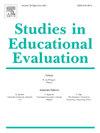预测来自绩优经济体的适应性强的学生的数学素养:机器学习方法
IF 2.6
2区 教育学
Q1 EDUCATION & EDUCATIONAL RESEARCH
引用次数: 0
摘要
数学对所有学生来说都是一门重要而又充满挑战的学科。因此,了解学业适应力在数学中的作用非常重要,它能帮助学生克服学业挑战。本研究应用了两种机器学习算法--拉索回归(LR)和随机森林(RF)--来预测 2022 年国际学生评估项目(PISA)中来自不同文化背景的高绩效经济体学生的数学素养。研究结果表明,RF 和 LR 在西方文化中的表现均优于东方文化。此外,在东方文化中,21 世纪技能的数学自我效能感在预测抗挫折学生的数学素养方面发挥了重要作用,其次是数学自我效能感和数学焦虑。在西方文化中,对数学的自我效能感是最主要的预测因素,其次是对 21 世纪技能的数学自我效能感。从理论上讲,本研究确定了预测不同文化背景下弹性学生数学素养的关键因素。在方法论上,本研究首次将 ML 应用于探究具有适应力的学生的数学素养。在实践中,它为有兴趣制定干预措施以提高有适应力学生数学素养的教育工作者提供了指导。本文章由计算机程序翻译,如有差异,请以英文原文为准。
Predicting the Mathematics Literacy of Resilient Students from High‐performing Economies: A Machine Learning Approach
Mathematics is a crucial yet challenging subject for all students. Therefore, it is important to understand the role of academic resilience in mathematics, which enables students to overcome academic challenges. This study applied two machine learning algorithms, Lasso Regression (LR) and Random Forest (RF), to predict the mathematics literacy of resilient students from high-performing economies across cultures in PISA 2022. The findings indicated both RF and LR performed better in Western cultures than in Eastern cultures. Furthermore, in Eastern cultures, mathematics self-efficacy for 21st-century skills played an important role in predicting resilient students’ mathematics literacy, followed by self-efficacy towards mathematics, and mathematics anxiety. In Western cultures, self-efficacy towards mathematics was the predominant predictor, followed by mathematics self-efficacy for 21st-century skills. Theoretically, this study identifies key factors in predicting resilient students’ mathematics literacy across cultures. Methodologically, it is the first to apply ML in exploring resilient students’ mathematics literacy. Practically, it guides educators interested in developing interventions to improve resilient students’ mathematics literacy.
求助全文
通过发布文献求助,成功后即可免费获取论文全文。
去求助
来源期刊

Studies in Educational Evaluation
Multiple-
CiteScore
6.90
自引率
6.50%
发文量
90
审稿时长
62 days
期刊介绍:
Studies in Educational Evaluation publishes original reports of evaluation studies. Four types of articles are published by the journal: (a) Empirical evaluation studies representing evaluation practice in educational systems around the world; (b) Theoretical reflections and empirical studies related to issues involved in the evaluation of educational programs, educational institutions, educational personnel and student assessment; (c) Articles summarizing the state-of-the-art concerning specific topics in evaluation in general or in a particular country or group of countries; (d) Book reviews and brief abstracts of evaluation studies.
 求助内容:
求助内容: 应助结果提醒方式:
应助结果提醒方式:


